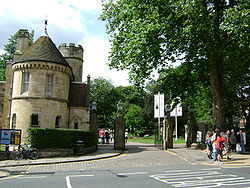| Museum Gardens | |
|---|---|
 Main Gates and lodge house of York Museum Gardens | |
 | |
| Location | York, England |
| Area | 10 acres (0.040 km2) |
| Created | 1835 |
| Operated by | York Museums Trust |
| Visitors | 1,651,508 (2019–2020)[1] |
| Status | Open 7 days a week, 10:30 am to 6 pm. |
| Website | http://www.yorkmuseumgardens.org.uk/ |
The York Museum Gardens are botanic gardens in the centre of York, England, beside the River Ouse. They cover an area of 10 acres (4.0 ha) of the former grounds of St Mary's Abbey, and were created in the 1830s by the Yorkshire Philosophical Society along with the Yorkshire Museum which they contain.
The gardens are held in trust by the City of York Council and are managed by the York Museums Trust. They were designed in a gardenesque style by landscape architect Sir John Murray Naysmith, and contain a variety of species of plants, trees and birds. Admission is free. A variety of events take place in the gardens, such as open-air theatre performances and festival activities.
There are several historic buildings in the gardens. They contain the remains of the west corner of the Roman fort of Eboracum, including the Multangular Tower and parts of the Roman walls. In the same area there is also the Anglian Tower, which was probably built into the remains of a late Roman period fortress. During the Middle Ages, the tower was expanded and the Roman walls were incorporated into York's city walls. Most of the other buildings dating from the Middle Ages are associated with St Mary's Abbey, including the ruins of the abbey church, the Hospitium, the lodge and part of the surviving precinct wall. The remains of St. Leonard's Hospital chapel and undercroft are on the east side of the gardens. The Yorkshire Philosophical Society constructed several buildings in the gardens during the 19th and early 20th century, including the Yorkshire Museum and its octagonal observatory. The museum houses four permanent collections, covering biology, geology, archaeology and astronomy.

- ^ York Museums Trust Annual Review 2019–2020 (PDF) (Report). York Museums Trust. 2020. Retrieved 26 May 2022.